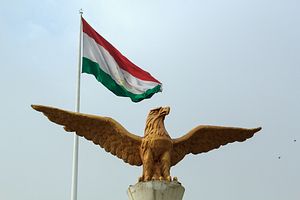Monday, the International Crisis Group released a report that chronicles the litany of internal and external pressures being put on Tajikistan’s stability. It’s no question that 2015 was an eventful year for the country, but very little was surprising about the sustained crackdown on Islam and continued state persecution of opposition voices. But set against a background of regional economic malaise and insecurity in Afghanistan, concern about Tajikistan is justified, even if long-time watchers are not surprised.
The Crisis Group report is broken into three sections, which look separately at internal threats to stability, the Afghan border, and Tajikistan’s external relations. The core of the report’s argument is that Tajikistan is an increasingly unstable state. The question of whether the Rahmon regime is operating from a place of power, or scrambling to retain it, is critical and Crisis Group has weighed in on the side of those who say Tajikistan is unstable (I’ve argued for more nuance in this exact debate).
The banning of the Islamic Renaissance Party (IRPT) — which the report characterizes as the “only meaningful opposition party” — plus the arrests of oppositionists, the assassination of an opposition leader in Istanbul last March, and the tightening screws on civil society are viewed as evidence of a state scrambling to retain its power. “The president is not in a stronger position as a result. His political and security apparatus is fragile,” the report says.
The defection of Gulmurod Halimov, formerly the commander of a special police unit, to ISIS in the spring of 2015 and the short-lived mutiny of Deputy Defense Minister Abduhalim Nazarzoda in the fall “point to crumbling loyalties,” according to Crisis Group.
Further, a Russian diplomat speaking to Crisis Group said that Dushanbe controls just 30 percent of the country and the footnote adds that a European diplomat said something similar.
“Since the civil war’s end, Rahmon has tried to marginalize and eliminate opponents,” the report states. But Rahmon has done more than try to marginalize opponents — he’s succeeded in doing so.
Crisis Group returns to a common theme that continued crackdowns on opposition and restrictive state policies regarding Islam will spark Islamic radicalization and feed state instability. But even the report hedges (emphasis added):
While there is no indication that violent religious extremism has attracted mass support, the government’s heavy-handed tactics adversely impact the devout, fueling resentment and radicalizing moderate believers. They also underscore that the government lacks the political strategy and security skills to devise targeted security measures, including prevention, against genuine threats.
Moving to external factors, the report looks first at the Afghan border as a source of tension and weakness. On the sidelines of a Commonwealth of Independent States border guards’ council in November, Russian Colonel-General Alexander Manilov “said their estimates showed that ‘around 4,500 militants and terrorists’ had massed near the CIS in Afghanistan’s border areas,” according to Reuters. While the Crisis Group report does note that “some observers believe Russia and the Central Asian governments overstate the Islamic extremist threat, including IS and potential spillover from Afghanistan, to retain influence, gain financial advantage and justify internal repression,” it somewhat sidelines these assessments, saying that the risks are growing because of the U.S. drawdown in Afghanistan and intensified Pakistani campaigns in Waziristan driving Islamic Movement of Uzbekistan (IMU) fighters back into Afghanistan. A former Kyrgyz defense official told Crisis Group that the IMU has a two or three year timeline for returning its attentions on Central Asia.
The report says that the Washington and Beijing have distinctly less leverage with Dushanbe than Moscow does and should work “in cooperation with Moscow” on a serious conflict prevention effort. It’s not clear, however, how such cooperation would work as Moscow and Washington, in particular, have vastly different approaches to the region. While the report comments that “Russia is concerned by Rahmon’s authoritarian trajectory but only in so far as it could trigger domestic instability,” there’s no supporting evidence for that statement. The recommendations fall into a fantasy wish-list: the United States and EU should focus on accountability, tracking aid, and not tolerating corruption while the report looks for Russia to urge Rahmon to honor the 1997 peace treaty and relax pressure on Muslims.































